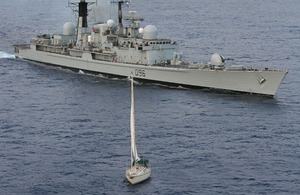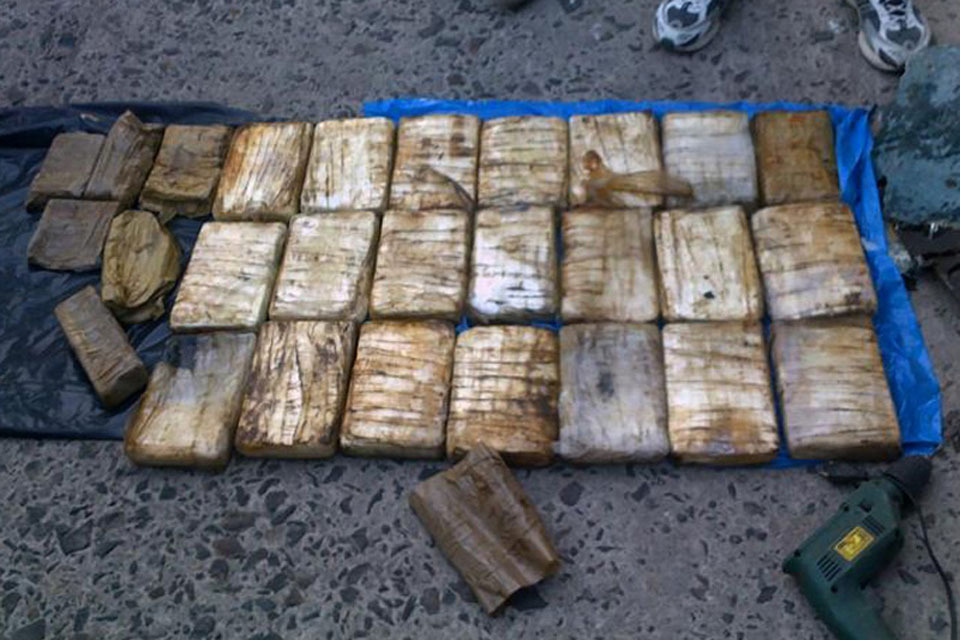HMS Gloucester foils drug smugglers
The crew of HMS Gloucester has intercepted a yacht in the mid-Atlantic smuggling cocaine with a UK street value of at least £4m.

HMS Gloucester alongside the yacht Tortuga in the Atlantic Ocean [Picture: Crown Copyright/MOD 2010]
The incident happened in the early hours of Friday 27 August 2010, when a Law Enforcement Detachment (LEDET) from Cape Verde, embarked on HMS Gloucester, boarded the suspect yacht.
The vessel, ‘Tortuga’, registered in Florida, was taken to Cape Verde where authorities discovered cocaine hidden within the rudder.
The operation was co-ordinated by the Maritime Analysis and Operations Centre - Narcotics (MAOC-N) based in Lisbon, acting on intelligence from a French Central Office against Illegal Narcotics Trafficking investigation.
The Royal Navy was asked for assistance and HMS Gloucester, en route south to the Falklands where she will spend the next seven months patrolling around UK overseas territories, was diverted to embark the Cape Verde LEDET and intercept the suspect yacht.
HMS Gloucester’s Commanding Officer, Commander David George, said:
The last thing a drug smuggler wants to be seeing as the sun comes up is a Royal Navy warship bearing down on him. He can’t run and he can’t fight.
HMS Gloucester provided the ideal launching pad for the Cape Verde law enforcement team to intercept these drugs. It’s fast, has long-range detection radar, and one of the fastest helicopters in the world, the Lynx Mk8.
There was no argument. Thanks to close co-operation between the Cape Verde authorities, international counter-narcotics agencies and the Royal Navy, millions of pounds’ worth of cocaine has been stopped from reaching our streets.

The cocaine found hidden within the Tortuga's rudder [Picture: Crown Copyright/MOD 2010]
This is the first maritime operation of this nature undertaken by the UK with the Cape Verde authorities but comes after concerted efforts by the Royal Navy and the Serious Organised Crime Agency (SOCA) to develop the counter-narcotics capability of the area.
Just weeks ago Admiral Sir Trevor Soar, Royal Navy Commander-in-Chief Fleet, paid a visit to the headquarters of the MAOC-N in Lisbon, underlining the crucial role the Royal Navy and SOCA have in combating the effects of drugs on the UK’s and our allies’ streets.
Conor Shields, a SOCA officer seconded to MAOC-N as Head of the Joint Operations Co-ordination Centre, said:
MAOC-N is extremely grateful for the continued support of the Royal Navy and pleased at the fruition of the capacity-building efforts. The professionalism of the Cape Verde authorities was paramount in discovering the purpose-built concealment.
This is a perfect example of operational success underlined by the scale of multinational and multi-agency co-operation. It is with these collaborative, concerted efforts against common objectives we continue to target the organised crime groups which cause so much harm to our communities.
Defence Secretary Dr Liam Fox said:
This is another example of the great work the men and women of the Royal Navy carry out around the world which helps protect us at home. The Royal Navy plays a crucial role in intercepting drugs that could be destined for Britain’s streets. I am very proud of their efforts.
HMS Gloucester is a Type 42 destroyer with a lengthened hull for better sea-keeping qualities and greater endurance. The ship was built by Vosper Thornycroft at Woolston, Southampton, and launched on 2 November 1982 by Her Royal Highness The Duchess of Gloucester. The ship retains links with The Rifles regiment and the city of Gloucester.
MAOC-N is an international agency set up to co-ordinate counter-drug operations, targeting trans-Atlantic cocaine traffic by air and sea. The participating states are France, Ireland, Italy, the Netherlands, Portugal, Spain and the United Kingdom.
The USA has permanent representation and Cape Verde recently became observers. Other observers include Europol, the European Commission, the United Nations Office on Drugs and Crime, Brazil, Morocco, Germany and Canada.
The centre has been operational since 1 April 2007 and in that time has co-ordinated the seizure of over 45 tons of cocaine destined for the European market as well as over 30 tons of hashish.
Specialists from all the partner countries work side-by-side sharing and fusing intelligence before planning and co-ordinating the interdictions by air or sea. Its area of operations is the eastern Atlantic, from the Cape of Good Hope in southern Africa to the Norwegian Sea.